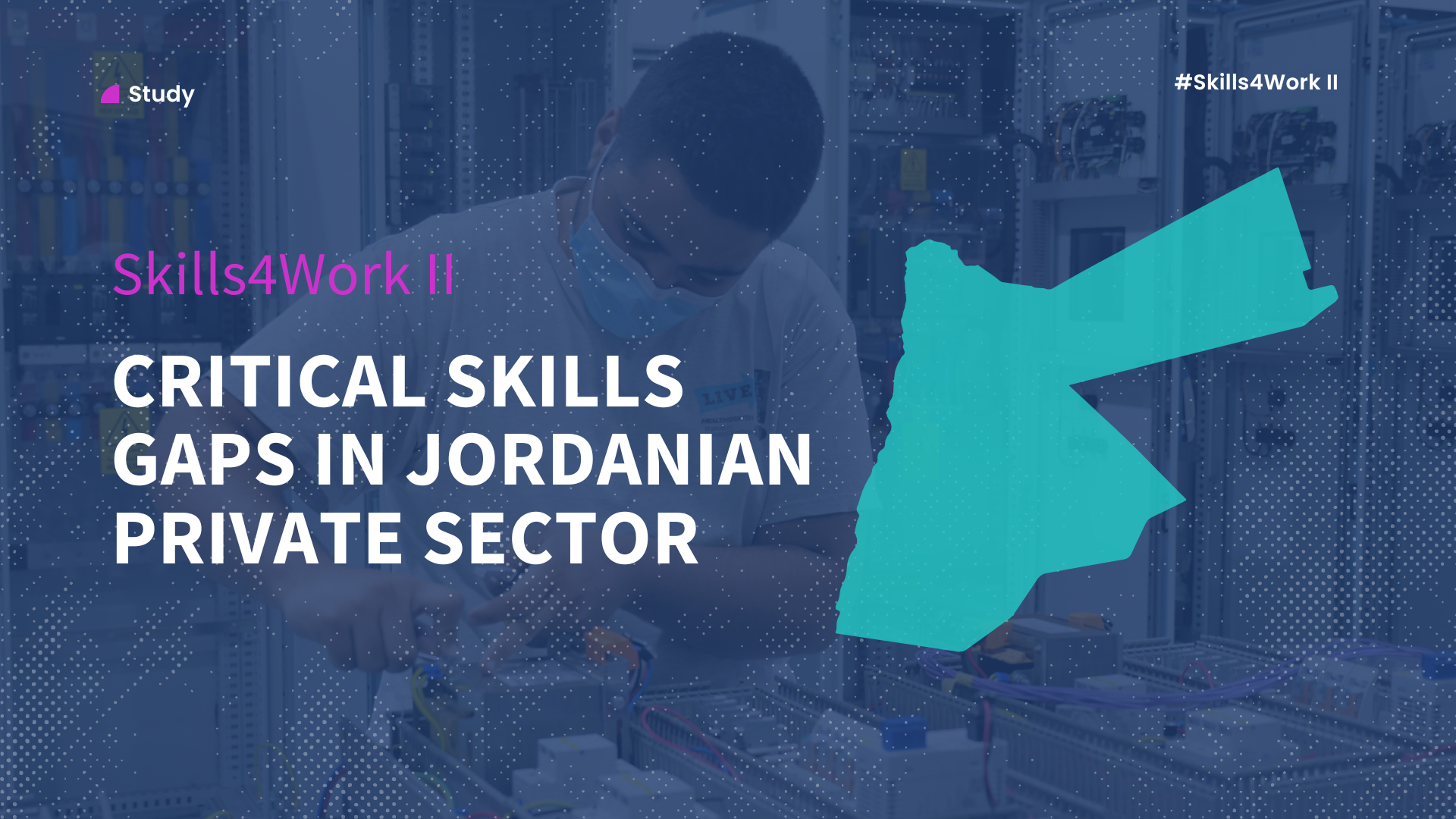
- 18 Nov 2024
A comprehensive study conducted under the Skills4Work II project has revealed significant insights into the private sector’s employment needs and workforce readiness within Jordan’s landscape. Designed to enhance employability and economic resilience for Jordanian host communities and Syrian refugees, Skills4Work II addresses the challenges of matching skills with market demands and developing sustainable livelihoods.
Skills4Work II advances Jordan’s Sustainable Development Goals (SDGs), notably in poverty reduction, quality education, gender equality, and economic growth. By localising demand-driven skills for Jordanian host communities and Syrian refugees, the project supports both economic resilience and sustainable livelihoods.
Key Findings on Skills Gaps and Employment Challenges
The study highlights an ongoing mismatch between the skills offered by job seekers and those required by Small and Medium Enterprises (SMEs) in Jordan, especially within the industrial and service sectors. According to the report, Jordanian SMEs require both soft skills—such as communication and teamwork—and technical skills specific to sectors like manufacturing, engineering, and information technology. Yet, many workers, including Syrian refugees, lack these competencies due to limitations in education and vocational training opportunities.
The project works to bridge the skills gap and directly contribute to SDG 4 (Quality Education) and SDG 8 (Decent Work and Economic Growth). By equipping participants with technical and soft skills needed by SMEs, Skills4Work II strengthens Jordan’s labour market and supports sustainable job creation in high-demand sectors.
The Role of SMEs and Priority Sectors
Jordanian SMEs, vital to the nation’s economic framework, represent essential drivers of job creation and regional economic integration. The report identifies priority sectors including engineering, chemical, plastics, and food processing industries, each facing specific workforce needs. For example:
- Engineering and IT: These industries require specialised skills to leverage advanced manufacturing technologies and maintain competitiveness in a globalised market.
- Food Processing and Agriculture: Vital for food security, these sectors face challenges such as water scarcity and rising operational costs. The report calls for more targeted skill development to enhance supply chain resilience.
- Garments and Textiles: With significant export potential, this sector needs innovation in design capabilities and efficiency improvements to remain competitive.
Gender Inclusivity and Socioeconomic Impact
Data from the study reveals a high representation of female participants, especially among Syrian refugees, indicating a critical need for gender-sensitive training and employment initiatives. The study emphasises that targeted programs should be designed to support the integration of women in the workforce, particularly in regions such as Al-Mafraq, Irbid, and Az Zarqa, where both Syrian and Jordanian women demonstrate strong participation.
This emphasis on gender inclusivity aligns with SDG 5 (Gender Equality) by providing skills training tailored to the specific needs of women, especially Syrian refugees, who often face cultural and logistical barriers to employment. The project empowers women to actively participate in the labour force, supporting both gender equality and economic inclusion.
Economic Disparities and Social Protection Gaps
Economic analysis shows substantial income disparities between Syrian refugees and Jordanians average monthly salaries. This income gap reflects broader employment challenges, including limited access to social security and high unemployment rates. The report suggests that supporting SMEs to formalise employment and providing social protections can significantly improve economic stability for both refugee and host communities.
By focusing on economic empowerment for vulnerable populations, Skills4Work II supports SDG 1 (No Poverty) and SDG 10 (Reduced Inequalities). Removing barriers to social protections and formal employment for both Syrian refugees and Jordanians fosters an inclusive economic framework that promotes stability and reduces poverty.
Strategic Recommendations
The study underscores the need for collaboration between SMEs, educational institutions, and government agencies. Key recommendations include:
- Enhanced Industry-Academia Partnerships: To ensure curriculum alignment with market needs, forging partnerships with industry associations is essential.
- Vocational Training Expansion: Customised training programs focused on practical skills for high-demand sectors, delivered in accessible formats, can bridge the skills gap.
- Continuous Professional Development: Emphasis on lifelong learning and adaptable skill-building frameworks can help individuals meet evolving industry demands.
These strategic recommendations align with SDG 8 (Decent Work and Economic Growth) and SDG 17 (Partnerships for the Goals), as the project collaborates with SMEs, vocational centres, and public agencies to build a resilient employment ecosystem.
Aiming for Sustainable Livelihoods and Economic Resilience
Skills4Work II plays a vital role in addressing Jordan’s unemployment crisis by prioritising local, sustainable solutions that align skills development with SME needs. With an approach centred on human rights, gender equality, and environmental sustainability, the project is set to empower Jordanian and Syrian refugee communities, creating pathways to decent employment and fostering inclusive economic growth.
By directly aligning with Jordan’s sustainable development priorities, Skills4Work II not only supports economic resilience and social inclusion but also actively contributes to achieving SDGs 1, 4, 5, 8, 10 and 17. The project’s strategic integration of the SDGs showcases its potential to drive meaningful, long-lasting change within Jordan’s communities.
“This article has been produced with the financial assistance of the European Regional Development and Protection Program (RDPP III) for Jordan and Lebanon which is supported by Austria, the Czech Republic, Denmark, the European Union, Ireland, the Netherlands, and Switzerland. The content of this document is the sole responsibility of Leaders International and can under no circumstances be regarded as reflecting the position of the RDPP or its donors.”